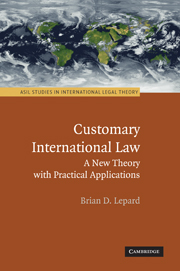Book contents
- Frontmatter
- Contents
- Figures
- Acknowledgments
- Cases
- PART ONE THE ENIGMAS OF CUSTOMARY INTERNATIONAL LAW
- PART TWO FOUNDATIONS OF A NEW THEORY OF CUSTOMARY INTERNATIONAL LAW
- PART THREE RESOLVING THE CONCEPTUAL ENIGMAS OF CUSTOMARY INTERNATIONAL LAW
- 6 Toward a New Normative Theory of Customary International Law
- 7 A New Understanding of Opinio Juris
- 8 The Function of the State Practice Requirement
- 9 Ethics and Customary International Law
- 10 Democratic Principles and Customary International Law
- 11 The Relationship Between Customary International Law and General Principles of Law
- PART FOUR RESOLVING THE PRACTICAL ENIGMAS OF CUSTOMARY INTERNATIONAL LAW
- PART FIVE SOME APPLICATIONS OF THE THEORY
- PART SIX THE FUTURE OF CUSTOMARY INTERNATIONAL LAW
- Bibliography
- Index
10 - Democratic Principles and Customary International Law
Published online by Cambridge University Press: 05 June 2012
- Frontmatter
- Contents
- Figures
- Acknowledgments
- Cases
- PART ONE THE ENIGMAS OF CUSTOMARY INTERNATIONAL LAW
- PART TWO FOUNDATIONS OF A NEW THEORY OF CUSTOMARY INTERNATIONAL LAW
- PART THREE RESOLVING THE CONCEPTUAL ENIGMAS OF CUSTOMARY INTERNATIONAL LAW
- 6 Toward a New Normative Theory of Customary International Law
- 7 A New Understanding of Opinio Juris
- 8 The Function of the State Practice Requirement
- 9 Ethics and Customary International Law
- 10 Democratic Principles and Customary International Law
- 11 The Relationship Between Customary International Law and General Principles of Law
- PART FOUR RESOLVING THE PRACTICAL ENIGMAS OF CUSTOMARY INTERNATIONAL LAW
- PART FIVE SOME APPLICATIONS OF THE THEORY
- PART SIX THE FUTURE OF CUSTOMARY INTERNATIONAL LAW
- Bibliography
- Index
Summary
GENERAL PRINCIPLES
What should be the role of democratic principles in the determination of customary international law? Based on fundamental ethical principles, we can conceptualize customary international law as a kind of law that is more flexible than treaty making. It allows states to develop legal rules without the formality and specificity of an agreement. The global community of states has consciously developed this alternative, more flexible, system of lawmaking that takes into account both states' views about what rules should be law and their practice as evidence of these views. Many commentators have noted the supple character of customary international law and that often it is “more easily adaptable to new conditions than conventional law.”
I suggest, in keeping with much of the existing doctrine of customary international law accepted by states, that customary law be analogized to an informal parliamentary system of lawmaking within the global community of states. In a similar vein, Norman and Trachtman say that “we might understand the [customary international law] process as an alternative mechanism for global legislation.”
Of course, there are no formal “votes” in this system and states do not meet in any kind of global parliament to adopt customary “laws.” It is accepted doctrine, however, that a majority of some grouping of states can through their words and practice create a legal rule that binds a minority of states, unless these states qualify as persistent objectors.
- Type
- Chapter
- Information
- Customary International LawA New Theory with Practical Applications, pp. 151 - 161Publisher: Cambridge University PressPrint publication year: 2010



